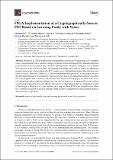| dc.contributor.author | Jin, Chenglu | |
| dc.contributor.author | Nguyen, Phuong Ha | |
| dc.contributor.author | Fuller, Benjamin | |
| dc.contributor.author | van Dijk, Marten | |
| dc.contributor.author | Nguyen, Phuong | |
| dc.contributor.author | Herder, Charles Henry | |
| dc.contributor.author | Devadas, Srinivas | |
| dc.contributor.author | Ren, Ling | |
| dc.date.accessioned | 2018-01-29T20:04:52Z | |
| dc.date.available | 2018-01-29T20:04:52Z | |
| dc.date.issued | 2017-12 | |
| dc.date.submitted | 2017-11 | |
| dc.identifier.issn | 2410-387X | |
| dc.identifier.uri | http://hdl.handle.net/1721.1/113338 | |
| dc.description.abstract | Herder et al. (IEEE Transactions on Dependable and Secure Computing, 2017) designed a new computational fuzzy extractor and physical unclonable function (PUF) challenge-response protocol based on the Learning Parity with Noise (LPN) problem. The protocol requires no irreversible state updates on the PUFs for security, like burning irreversible fuses, and can correct for significant measurement noise when compared to PUFs using a conventional (information theoretical secure) fuzzy extractor. However, Herder et al. did not implement their protocol. In this paper, we give the first implementation of a challenge response protocol based on computational fuzzy extractors. Our main insight is that “confidence information” does not need to be kept private, if the noise vector is independent of the confidence information, e.g., the bits generated by ring oscillator pairs which are physically placed close to each other. This leads to a construction which is a simplified version of the design of Herder et al. (also building on a ring oscillator PUF). Our simplifications allow for a dramatic reduction in area by making a mild security assumption on ring oscillator physical obfuscated key output bits. Keywords: physical unclonable function; learning parity with noise; fuzzy extractor | en_US |
| dc.description.sponsorship | National Science Foundation (U.S.) (Grant CNS-1617774) | en_US |
| dc.description.sponsorship | United States. Air Force Office of Scientific Research (Award FA9550-14-1-0351) | en_US |
| dc.description.sponsorship | National Science Foundation (U.S.) (Grant CNS-1523572) | en_US |
| dc.publisher | MDPI AG | en_US |
| dc.relation.isversionof | http://dx.doi.org/10.3390/cryptography1030023 | en_US |
| dc.rights | Creative Commons Attribution | en_US |
| dc.rights.uri | http://creativecommons.org/licenses/by/4.0/ | en_US |
| dc.source | Multidisciplinary Digital Publishing Institute | en_US |
| dc.title | FPGA Implementation of a Cryptographically-Secure PUF Based on Learning Parity with Noise | en_US |
| dc.type | Article | en_US |
| dc.identifier.citation | Jin, Chenglu et al. "FPGA Implementation of a Cryptographically-Secure PUF Based on Learning Parity with Noise." Cryptography 1,3 (2017 December): 23 © 2017 The Author(s) | en_US |
| dc.contributor.department | Massachusetts Institute of Technology. Computer Science and Artificial Intelligence Laboratory | en_US |
| dc.contributor.department | Massachusetts Institute of Technology. Department of Electrical Engineering and Computer Science | en_US |
| dc.contributor.mitauthor | Herder, Charles Henry | |
| dc.contributor.mitauthor | Devadas, Srinivas | |
| dc.contributor.mitauthor | Ren, Ling | |
| dc.relation.journal | Cryptography | en_US |
| dc.eprint.version | Final published version | en_US |
| dc.type.uri | http://purl.org/eprint/type/JournalArticle | en_US |
| eprint.status | http://purl.org/eprint/status/PeerReviewed | en_US |
| dc.date.updated | 2018-01-24T21:04:22Z | |
| dspace.orderedauthors | Jin, Chenglu; Herder, Charles; Ren, Ling; Nguyen, Phuong; Fuller, Benjamin; Devadas, Srinivas; van Dijk, Marten | en_US |
| dspace.embargo.terms | N | en_US |
| dc.identifier.orcid | https://orcid.org/0000-0003-1117-7293 | |
| dc.identifier.orcid | https://orcid.org/0000-0001-8253-7714 | |
| dc.identifier.orcid | https://orcid.org/0000-0003-3437-7570 | |
| mit.license | PUBLISHER_CC | en_US |
